CNA802 Management Reflective Journal: Mentoring, Team Roles
VerifiedAdded on 2023/04/26
|12
|3939
|351
AI Summary
This reflective journal critically reflects on the collaborative experience of a group project, demonstrating a theoretical understanding of team development and group processes. It incorporates team management theories of Belbin and Tuckman, reflecting on personal experiences within a healthcare team. The journal examines the author's strengths and weaknesses, impact on the group, and insights gained through teamwork, including fostering creativity, building trust, and learning conflict resolution. Experiences and insights are discussed in relation to the author's role as a nursing staff member and how these skills will enhance patient care. This resource is available on Desklib, a platform offering a wealth of study materials and AI-based tools for students.
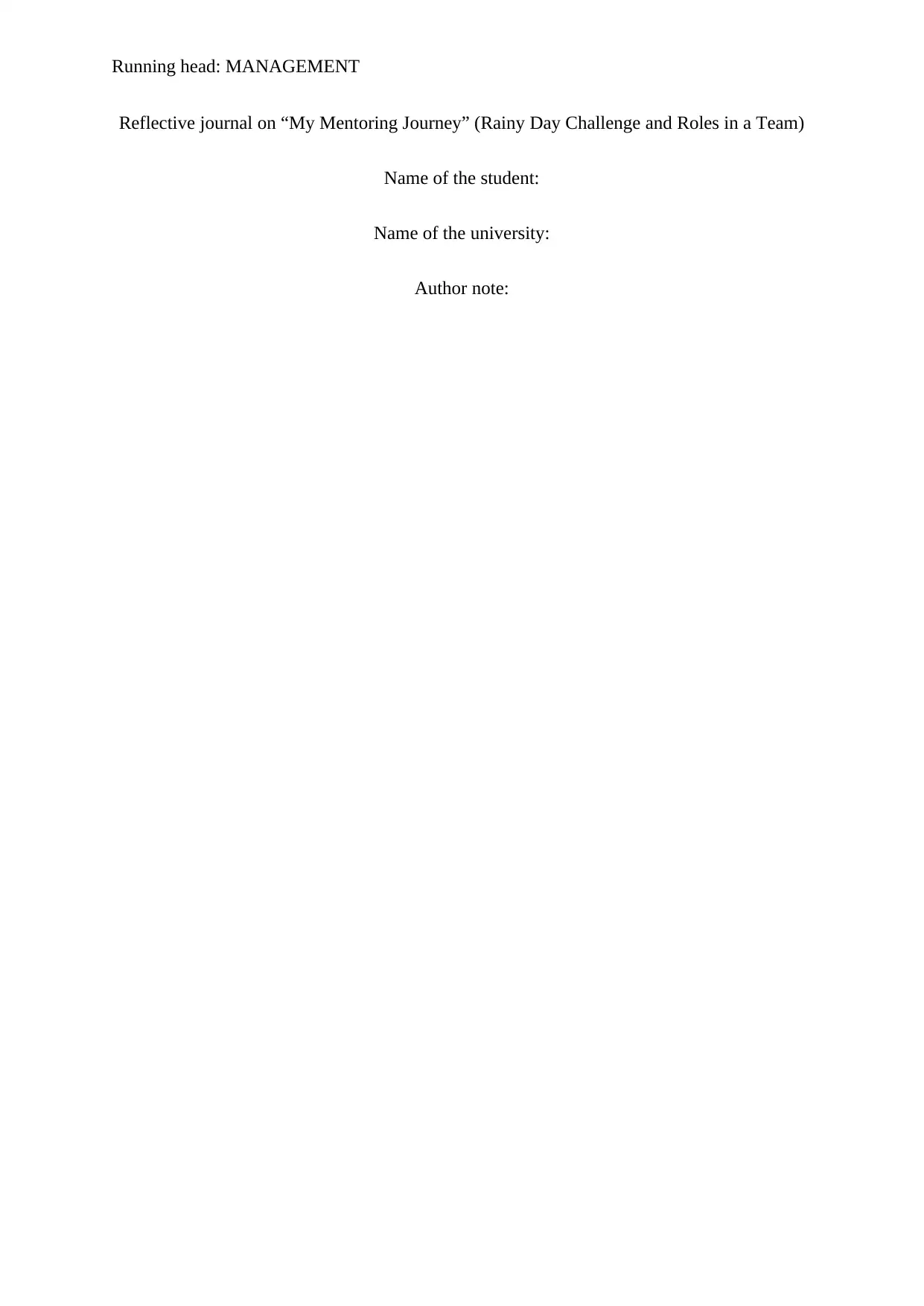
Running head: MANAGEMENT
Reflective journal on “My Mentoring Journey” (Rainy Day Challenge and Roles in a Team)
Name of the student:
Name of the university:
Author note:
Reflective journal on “My Mentoring Journey” (Rainy Day Challenge and Roles in a Team)
Name of the student:
Name of the university:
Author note:
Paraphrase This Document
Need a fresh take? Get an instant paraphrase of this document with our AI Paraphraser
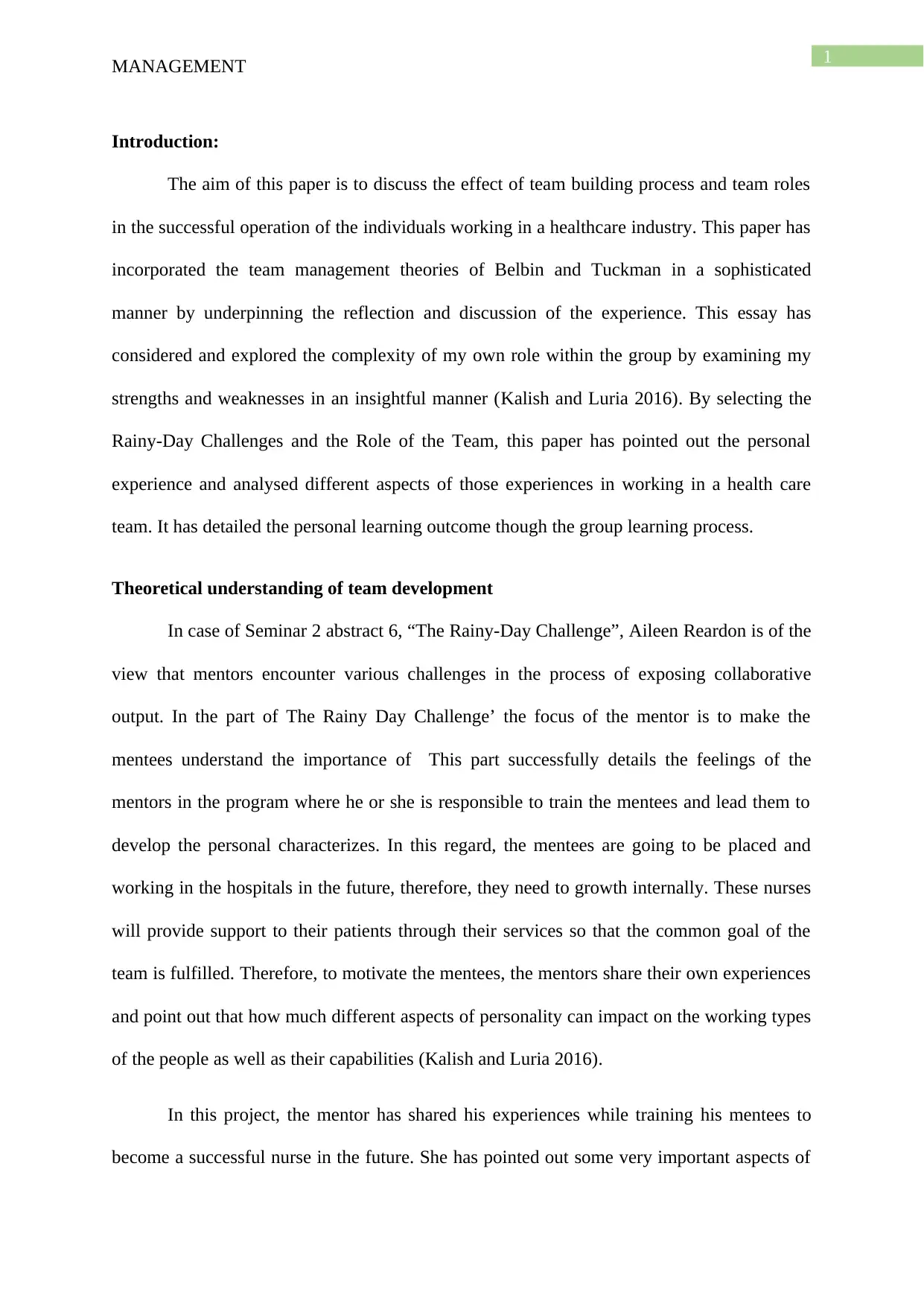
1
MANAGEMENT
Introduction:
The aim of this paper is to discuss the effect of team building process and team roles
in the successful operation of the individuals working in a healthcare industry. This paper has
incorporated the team management theories of Belbin and Tuckman in a sophisticated
manner by underpinning the reflection and discussion of the experience. This essay has
considered and explored the complexity of my own role within the group by examining my
strengths and weaknesses in an insightful manner (Kalish and Luria 2016). By selecting the
Rainy-Day Challenges and the Role of the Team, this paper has pointed out the personal
experience and analysed different aspects of those experiences in working in a health care
team. It has detailed the personal learning outcome though the group learning process.
Theoretical understanding of team development
In case of Seminar 2 abstract 6, “The Rainy-Day Challenge”, Aileen Reardon is of the
view that mentors encounter various challenges in the process of exposing collaborative
output. In the part of The Rainy Day Challenge’ the focus of the mentor is to make the
mentees understand the importance of This part successfully details the feelings of the
mentors in the program where he or she is responsible to train the mentees and lead them to
develop the personal characterizes. In this regard, the mentees are going to be placed and
working in the hospitals in the future, therefore, they need to growth internally. These nurses
will provide support to their patients through their services so that the common goal of the
team is fulfilled. Therefore, to motivate the mentees, the mentors share their own experiences
and point out that how much different aspects of personality can impact on the working types
of the people as well as their capabilities (Kalish and Luria 2016).
In this project, the mentor has shared his experiences while training his mentees to
become a successful nurse in the future. She has pointed out some very important aspects of
MANAGEMENT
Introduction:
The aim of this paper is to discuss the effect of team building process and team roles
in the successful operation of the individuals working in a healthcare industry. This paper has
incorporated the team management theories of Belbin and Tuckman in a sophisticated
manner by underpinning the reflection and discussion of the experience. This essay has
considered and explored the complexity of my own role within the group by examining my
strengths and weaknesses in an insightful manner (Kalish and Luria 2016). By selecting the
Rainy-Day Challenges and the Role of the Team, this paper has pointed out the personal
experience and analysed different aspects of those experiences in working in a health care
team. It has detailed the personal learning outcome though the group learning process.
Theoretical understanding of team development
In case of Seminar 2 abstract 6, “The Rainy-Day Challenge”, Aileen Reardon is of the
view that mentors encounter various challenges in the process of exposing collaborative
output. In the part of The Rainy Day Challenge’ the focus of the mentor is to make the
mentees understand the importance of This part successfully details the feelings of the
mentors in the program where he or she is responsible to train the mentees and lead them to
develop the personal characterizes. In this regard, the mentees are going to be placed and
working in the hospitals in the future, therefore, they need to growth internally. These nurses
will provide support to their patients through their services so that the common goal of the
team is fulfilled. Therefore, to motivate the mentees, the mentors share their own experiences
and point out that how much different aspects of personality can impact on the working types
of the people as well as their capabilities (Kalish and Luria 2016).
In this project, the mentor has shared his experiences while training his mentees to
become a successful nurse in the future. She has pointed out some very important aspects of
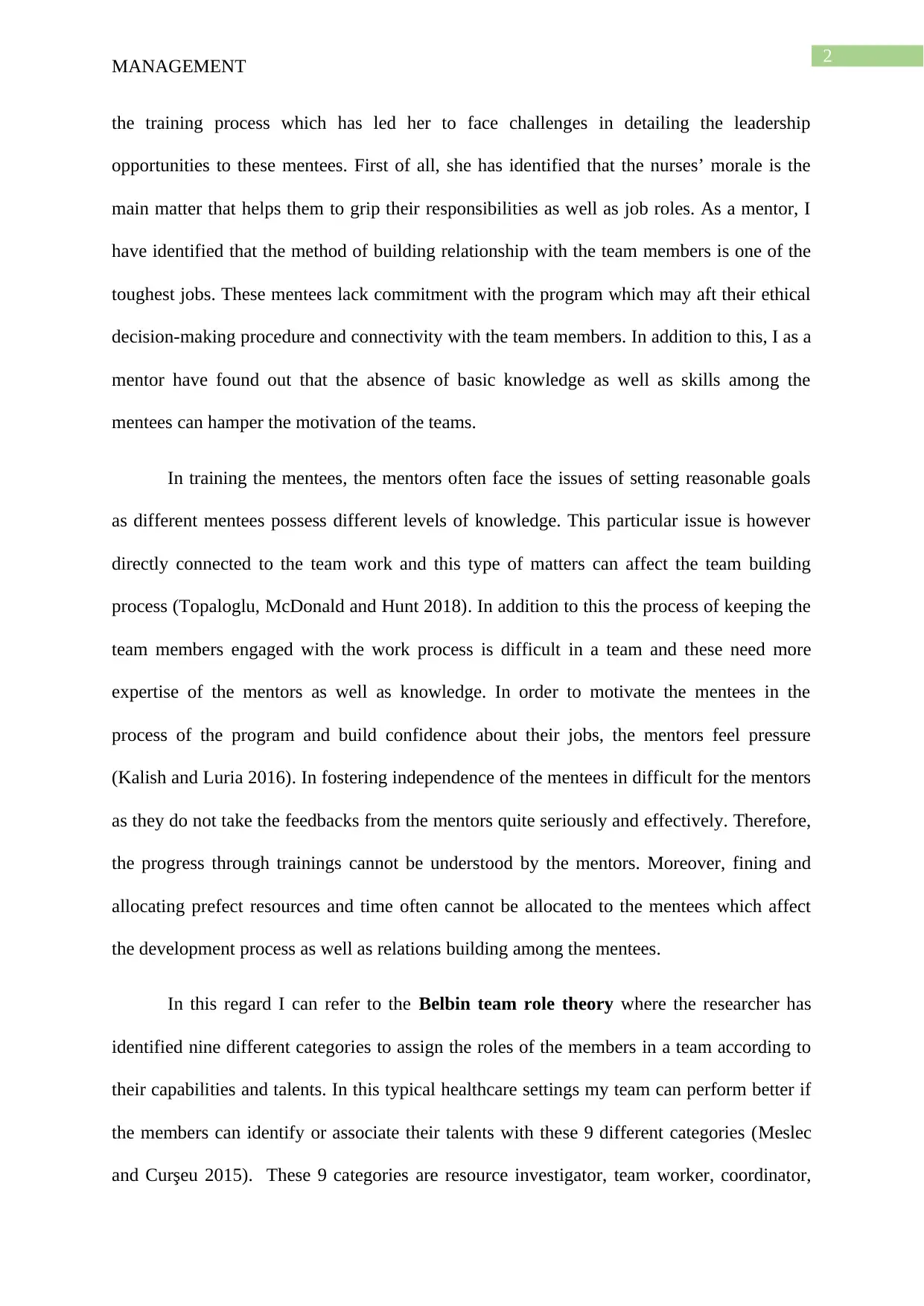
2
MANAGEMENT
the training process which has led her to face challenges in detailing the leadership
opportunities to these mentees. First of all, she has identified that the nurses’ morale is the
main matter that helps them to grip their responsibilities as well as job roles. As a mentor, I
have identified that the method of building relationship with the team members is one of the
toughest jobs. These mentees lack commitment with the program which may aft their ethical
decision-making procedure and connectivity with the team members. In addition to this, I as a
mentor have found out that the absence of basic knowledge as well as skills among the
mentees can hamper the motivation of the teams.
In training the mentees, the mentors often face the issues of setting reasonable goals
as different mentees possess different levels of knowledge. This particular issue is however
directly connected to the team work and this type of matters can affect the team building
process (Topaloglu, McDonald and Hunt 2018). In addition to this the process of keeping the
team members engaged with the work process is difficult in a team and these need more
expertise of the mentors as well as knowledge. In order to motivate the mentees in the
process of the program and build confidence about their jobs, the mentors feel pressure
(Kalish and Luria 2016). In fostering independence of the mentees in difficult for the mentors
as they do not take the feedbacks from the mentors quite seriously and effectively. Therefore,
the progress through trainings cannot be understood by the mentors. Moreover, fining and
allocating prefect resources and time often cannot be allocated to the mentees which affect
the development process as well as relations building among the mentees.
In this regard I can refer to the Belbin team role theory where the researcher has
identified nine different categories to assign the roles of the members in a team according to
their capabilities and talents. In this typical healthcare settings my team can perform better if
the members can identify or associate their talents with these 9 different categories (Meslec
and Curşeu 2015). These 9 categories are resource investigator, team worker, coordinator,
MANAGEMENT
the training process which has led her to face challenges in detailing the leadership
opportunities to these mentees. First of all, she has identified that the nurses’ morale is the
main matter that helps them to grip their responsibilities as well as job roles. As a mentor, I
have identified that the method of building relationship with the team members is one of the
toughest jobs. These mentees lack commitment with the program which may aft their ethical
decision-making procedure and connectivity with the team members. In addition to this, I as a
mentor have found out that the absence of basic knowledge as well as skills among the
mentees can hamper the motivation of the teams.
In training the mentees, the mentors often face the issues of setting reasonable goals
as different mentees possess different levels of knowledge. This particular issue is however
directly connected to the team work and this type of matters can affect the team building
process (Topaloglu, McDonald and Hunt 2018). In addition to this the process of keeping the
team members engaged with the work process is difficult in a team and these need more
expertise of the mentors as well as knowledge. In order to motivate the mentees in the
process of the program and build confidence about their jobs, the mentors feel pressure
(Kalish and Luria 2016). In fostering independence of the mentees in difficult for the mentors
as they do not take the feedbacks from the mentors quite seriously and effectively. Therefore,
the progress through trainings cannot be understood by the mentors. Moreover, fining and
allocating prefect resources and time often cannot be allocated to the mentees which affect
the development process as well as relations building among the mentees.
In this regard I can refer to the Belbin team role theory where the researcher has
identified nine different categories to assign the roles of the members in a team according to
their capabilities and talents. In this typical healthcare settings my team can perform better if
the members can identify or associate their talents with these 9 different categories (Meslec
and Curşeu 2015). These 9 categories are resource investigator, team worker, coordinator,
⊘ This is a preview!⊘
Do you want full access?
Subscribe today to unlock all pages.

Trusted by 1+ million students worldwide
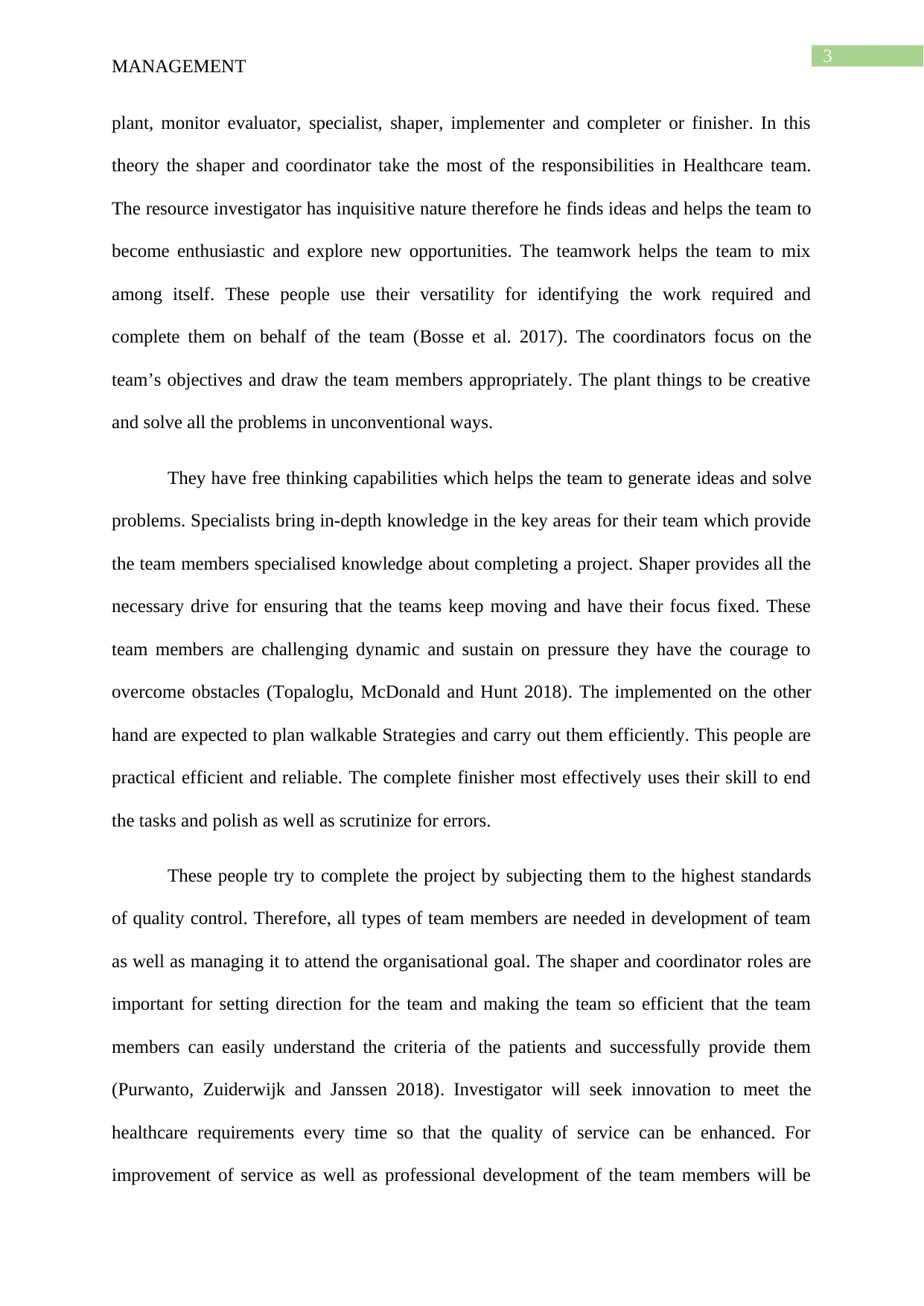
3
MANAGEMENT
plant, monitor evaluator, specialist, shaper, implementer and completer or finisher. In this
theory the shaper and coordinator take the most of the responsibilities in Healthcare team.
The resource investigator has inquisitive nature therefore he finds ideas and helps the team to
become enthusiastic and explore new opportunities. The teamwork helps the team to mix
among itself. These people use their versatility for identifying the work required and
complete them on behalf of the team (Bosse et al. 2017). The coordinators focus on the
team’s objectives and draw the team members appropriately. The plant things to be creative
and solve all the problems in unconventional ways.
They have free thinking capabilities which helps the team to generate ideas and solve
problems. Specialists bring in-depth knowledge in the key areas for their team which provide
the team members specialised knowledge about completing a project. Shaper provides all the
necessary drive for ensuring that the teams keep moving and have their focus fixed. These
team members are challenging dynamic and sustain on pressure they have the courage to
overcome obstacles (Topaloglu, McDonald and Hunt 2018). The implemented on the other
hand are expected to plan walkable Strategies and carry out them efficiently. This people are
practical efficient and reliable. The complete finisher most effectively uses their skill to end
the tasks and polish as well as scrutinize for errors.
These people try to complete the project by subjecting them to the highest standards
of quality control. Therefore, all types of team members are needed in development of team
as well as managing it to attend the organisational goal. The shaper and coordinator roles are
important for setting direction for the team and making the team so efficient that the team
members can easily understand the criteria of the patients and successfully provide them
(Purwanto, Zuiderwijk and Janssen 2018). Investigator will seek innovation to meet the
healthcare requirements every time so that the quality of service can be enhanced. For
improvement of service as well as professional development of the team members will be
MANAGEMENT
plant, monitor evaluator, specialist, shaper, implementer and completer or finisher. In this
theory the shaper and coordinator take the most of the responsibilities in Healthcare team.
The resource investigator has inquisitive nature therefore he finds ideas and helps the team to
become enthusiastic and explore new opportunities. The teamwork helps the team to mix
among itself. These people use their versatility for identifying the work required and
complete them on behalf of the team (Bosse et al. 2017). The coordinators focus on the
team’s objectives and draw the team members appropriately. The plant things to be creative
and solve all the problems in unconventional ways.
They have free thinking capabilities which helps the team to generate ideas and solve
problems. Specialists bring in-depth knowledge in the key areas for their team which provide
the team members specialised knowledge about completing a project. Shaper provides all the
necessary drive for ensuring that the teams keep moving and have their focus fixed. These
team members are challenging dynamic and sustain on pressure they have the courage to
overcome obstacles (Topaloglu, McDonald and Hunt 2018). The implemented on the other
hand are expected to plan walkable Strategies and carry out them efficiently. This people are
practical efficient and reliable. The complete finisher most effectively uses their skill to end
the tasks and polish as well as scrutinize for errors.
These people try to complete the project by subjecting them to the highest standards
of quality control. Therefore, all types of team members are needed in development of team
as well as managing it to attend the organisational goal. The shaper and coordinator roles are
important for setting direction for the team and making the team so efficient that the team
members can easily understand the criteria of the patients and successfully provide them
(Purwanto, Zuiderwijk and Janssen 2018). Investigator will seek innovation to meet the
healthcare requirements every time so that the quality of service can be enhanced. For
improvement of service as well as professional development of the team members will be
Paraphrase This Document
Need a fresh take? Get an instant paraphrase of this document with our AI Paraphraser
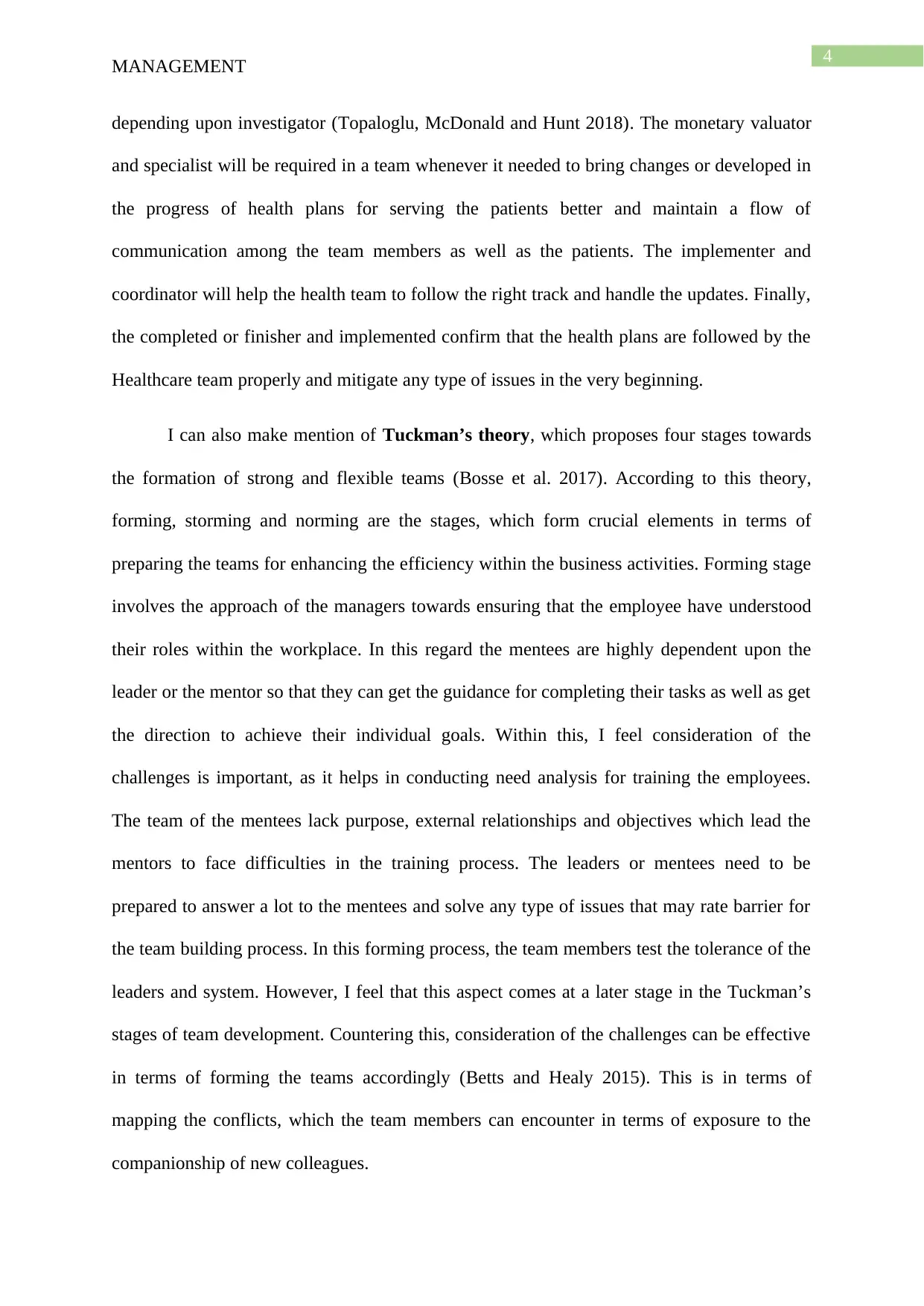
4
MANAGEMENT
depending upon investigator (Topaloglu, McDonald and Hunt 2018). The monetary valuator
and specialist will be required in a team whenever it needed to bring changes or developed in
the progress of health plans for serving the patients better and maintain a flow of
communication among the team members as well as the patients. The implementer and
coordinator will help the health team to follow the right track and handle the updates. Finally,
the completed or finisher and implemented confirm that the health plans are followed by the
Healthcare team properly and mitigate any type of issues in the very beginning.
I can also make mention of Tuckman’s theory, which proposes four stages towards
the formation of strong and flexible teams (Bosse et al. 2017). According to this theory,
forming, storming and norming are the stages, which form crucial elements in terms of
preparing the teams for enhancing the efficiency within the business activities. Forming stage
involves the approach of the managers towards ensuring that the employee have understood
their roles within the workplace. In this regard the mentees are highly dependent upon the
leader or the mentor so that they can get the guidance for completing their tasks as well as get
the direction to achieve their individual goals. Within this, I feel consideration of the
challenges is important, as it helps in conducting need analysis for training the employees.
The team of the mentees lack purpose, external relationships and objectives which lead the
mentors to face difficulties in the training process. The leaders or mentees need to be
prepared to answer a lot to the mentees and solve any type of issues that may rate barrier for
the team building process. In this forming process, the team members test the tolerance of the
leaders and system. However, I feel that this aspect comes at a later stage in the Tuckman’s
stages of team development. Countering this, consideration of the challenges can be effective
in terms of forming the teams accordingly (Betts and Healy 2015). This is in terms of
mapping the conflicts, which the team members can encounter in terms of exposure to the
companionship of new colleagues.
MANAGEMENT
depending upon investigator (Topaloglu, McDonald and Hunt 2018). The monetary valuator
and specialist will be required in a team whenever it needed to bring changes or developed in
the progress of health plans for serving the patients better and maintain a flow of
communication among the team members as well as the patients. The implementer and
coordinator will help the health team to follow the right track and handle the updates. Finally,
the completed or finisher and implemented confirm that the health plans are followed by the
Healthcare team properly and mitigate any type of issues in the very beginning.
I can also make mention of Tuckman’s theory, which proposes four stages towards
the formation of strong and flexible teams (Bosse et al. 2017). According to this theory,
forming, storming and norming are the stages, which form crucial elements in terms of
preparing the teams for enhancing the efficiency within the business activities. Forming stage
involves the approach of the managers towards ensuring that the employee have understood
their roles within the workplace. In this regard the mentees are highly dependent upon the
leader or the mentor so that they can get the guidance for completing their tasks as well as get
the direction to achieve their individual goals. Within this, I feel consideration of the
challenges is important, as it helps in conducting need analysis for training the employees.
The team of the mentees lack purpose, external relationships and objectives which lead the
mentors to face difficulties in the training process. The leaders or mentees need to be
prepared to answer a lot to the mentees and solve any type of issues that may rate barrier for
the team building process. In this forming process, the team members test the tolerance of the
leaders and system. However, I feel that this aspect comes at a later stage in the Tuckman’s
stages of team development. Countering this, consideration of the challenges can be effective
in terms of forming the teams accordingly (Betts and Healy 2015). This is in terms of
mapping the conflicts, which the team members can encounter in terms of exposure to the
companionship of new colleagues.
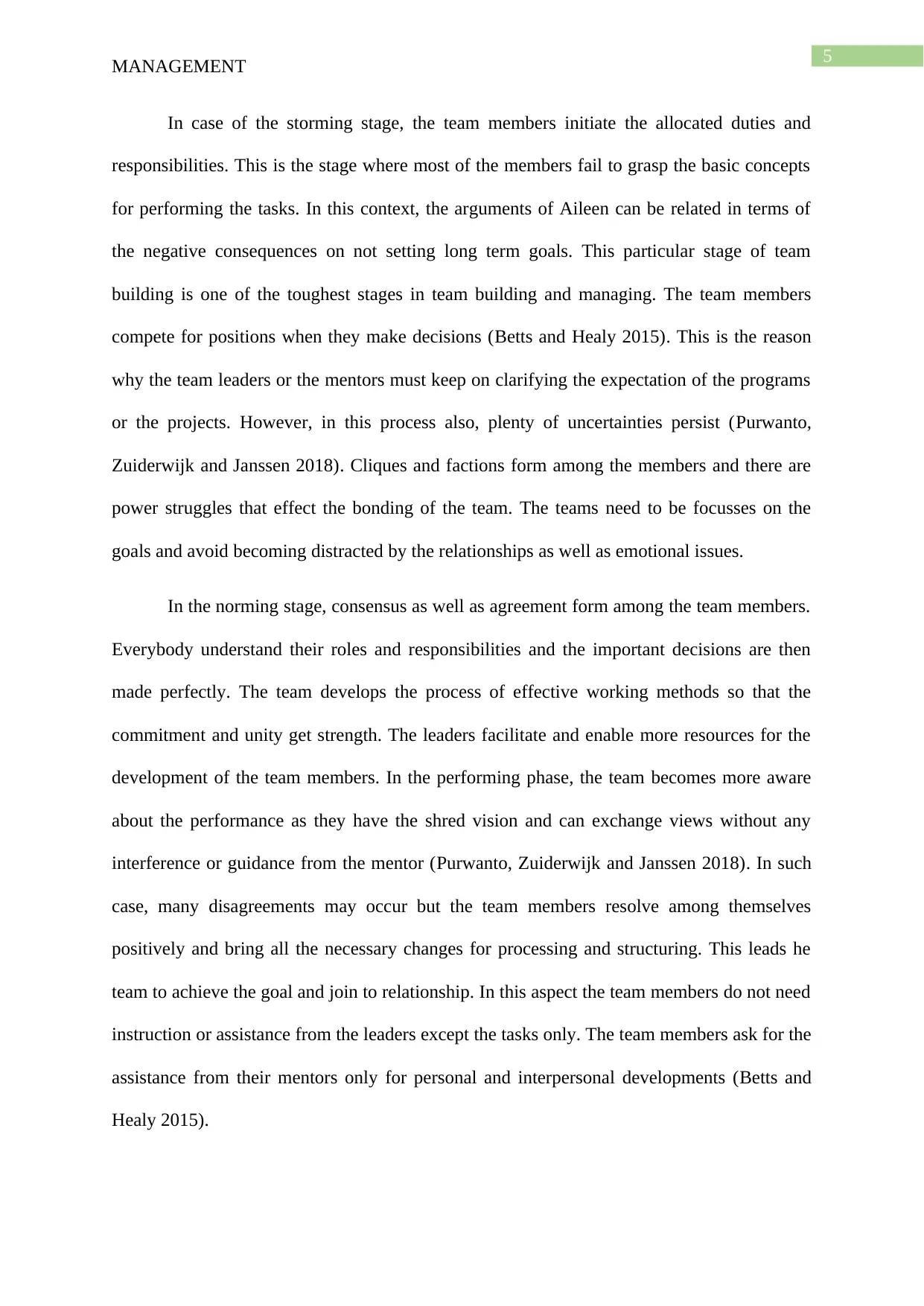
5
MANAGEMENT
In case of the storming stage, the team members initiate the allocated duties and
responsibilities. This is the stage where most of the members fail to grasp the basic concepts
for performing the tasks. In this context, the arguments of Aileen can be related in terms of
the negative consequences on not setting long term goals. This particular stage of team
building is one of the toughest stages in team building and managing. The team members
compete for positions when they make decisions (Betts and Healy 2015). This is the reason
why the team leaders or the mentors must keep on clarifying the expectation of the programs
or the projects. However, in this process also, plenty of uncertainties persist (Purwanto,
Zuiderwijk and Janssen 2018). Cliques and factions form among the members and there are
power struggles that effect the bonding of the team. The teams need to be focusses on the
goals and avoid becoming distracted by the relationships as well as emotional issues.
In the norming stage, consensus as well as agreement form among the team members.
Everybody understand their roles and responsibilities and the important decisions are then
made perfectly. The team develops the process of effective working methods so that the
commitment and unity get strength. The leaders facilitate and enable more resources for the
development of the team members. In the performing phase, the team becomes more aware
about the performance as they have the shred vision and can exchange views without any
interference or guidance from the mentor (Purwanto, Zuiderwijk and Janssen 2018). In such
case, many disagreements may occur but the team members resolve among themselves
positively and bring all the necessary changes for processing and structuring. This leads he
team to achieve the goal and join to relationship. In this aspect the team members do not need
instruction or assistance from the leaders except the tasks only. The team members ask for the
assistance from their mentors only for personal and interpersonal developments (Betts and
Healy 2015).
MANAGEMENT
In case of the storming stage, the team members initiate the allocated duties and
responsibilities. This is the stage where most of the members fail to grasp the basic concepts
for performing the tasks. In this context, the arguments of Aileen can be related in terms of
the negative consequences on not setting long term goals. This particular stage of team
building is one of the toughest stages in team building and managing. The team members
compete for positions when they make decisions (Betts and Healy 2015). This is the reason
why the team leaders or the mentors must keep on clarifying the expectation of the programs
or the projects. However, in this process also, plenty of uncertainties persist (Purwanto,
Zuiderwijk and Janssen 2018). Cliques and factions form among the members and there are
power struggles that effect the bonding of the team. The teams need to be focusses on the
goals and avoid becoming distracted by the relationships as well as emotional issues.
In the norming stage, consensus as well as agreement form among the team members.
Everybody understand their roles and responsibilities and the important decisions are then
made perfectly. The team develops the process of effective working methods so that the
commitment and unity get strength. The leaders facilitate and enable more resources for the
development of the team members. In the performing phase, the team becomes more aware
about the performance as they have the shred vision and can exchange views without any
interference or guidance from the mentor (Purwanto, Zuiderwijk and Janssen 2018). In such
case, many disagreements may occur but the team members resolve among themselves
positively and bring all the necessary changes for processing and structuring. This leads he
team to achieve the goal and join to relationship. In this aspect the team members do not need
instruction or assistance from the leaders except the tasks only. The team members ask for the
assistance from their mentors only for personal and interpersonal developments (Betts and
Healy 2015).
⊘ This is a preview!⊘
Do you want full access?
Subscribe today to unlock all pages.

Trusted by 1+ million students worldwide
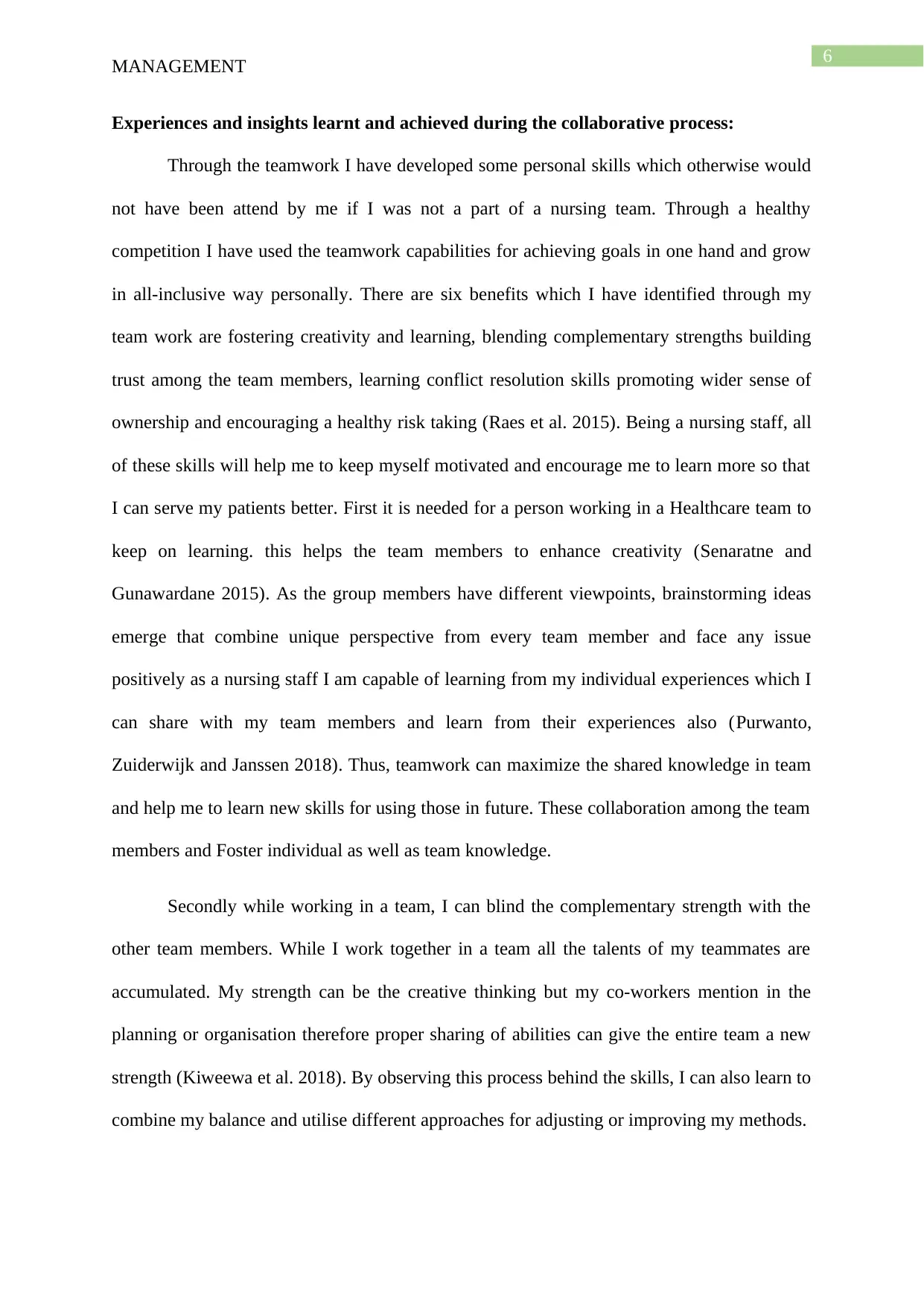
6
MANAGEMENT
Experiences and insights learnt and achieved during the collaborative process:
Through the teamwork I have developed some personal skills which otherwise would
not have been attend by me if I was not a part of a nursing team. Through a healthy
competition I have used the teamwork capabilities for achieving goals in one hand and grow
in all-inclusive way personally. There are six benefits which I have identified through my
team work are fostering creativity and learning, blending complementary strengths building
trust among the team members, learning conflict resolution skills promoting wider sense of
ownership and encouraging a healthy risk taking (Raes et al. 2015). Being a nursing staff, all
of these skills will help me to keep myself motivated and encourage me to learn more so that
I can serve my patients better. First it is needed for a person working in a Healthcare team to
keep on learning. this helps the team members to enhance creativity (Senaratne and
Gunawardane 2015). As the group members have different viewpoints, brainstorming ideas
emerge that combine unique perspective from every team member and face any issue
positively as a nursing staff I am capable of learning from my individual experiences which I
can share with my team members and learn from their experiences also (Purwanto,
Zuiderwijk and Janssen 2018). Thus, teamwork can maximize the shared knowledge in team
and help me to learn new skills for using those in future. These collaboration among the team
members and Foster individual as well as team knowledge.
Secondly while working in a team, I can blind the complementary strength with the
other team members. While I work together in a team all the talents of my teammates are
accumulated. My strength can be the creative thinking but my co-workers mention in the
planning or organisation therefore proper sharing of abilities can give the entire team a new
strength (Kiweewa et al. 2018). By observing this process behind the skills, I can also learn to
combine my balance and utilise different approaches for adjusting or improving my methods.
MANAGEMENT
Experiences and insights learnt and achieved during the collaborative process:
Through the teamwork I have developed some personal skills which otherwise would
not have been attend by me if I was not a part of a nursing team. Through a healthy
competition I have used the teamwork capabilities for achieving goals in one hand and grow
in all-inclusive way personally. There are six benefits which I have identified through my
team work are fostering creativity and learning, blending complementary strengths building
trust among the team members, learning conflict resolution skills promoting wider sense of
ownership and encouraging a healthy risk taking (Raes et al. 2015). Being a nursing staff, all
of these skills will help me to keep myself motivated and encourage me to learn more so that
I can serve my patients better. First it is needed for a person working in a Healthcare team to
keep on learning. this helps the team members to enhance creativity (Senaratne and
Gunawardane 2015). As the group members have different viewpoints, brainstorming ideas
emerge that combine unique perspective from every team member and face any issue
positively as a nursing staff I am capable of learning from my individual experiences which I
can share with my team members and learn from their experiences also (Purwanto,
Zuiderwijk and Janssen 2018). Thus, teamwork can maximize the shared knowledge in team
and help me to learn new skills for using those in future. These collaboration among the team
members and Foster individual as well as team knowledge.
Secondly while working in a team, I can blind the complementary strength with the
other team members. While I work together in a team all the talents of my teammates are
accumulated. My strength can be the creative thinking but my co-workers mention in the
planning or organisation therefore proper sharing of abilities can give the entire team a new
strength (Kiweewa et al. 2018). By observing this process behind the skills, I can also learn to
combine my balance and utilise different approaches for adjusting or improving my methods.
Paraphrase This Document
Need a fresh take? Get an instant paraphrase of this document with our AI Paraphraser
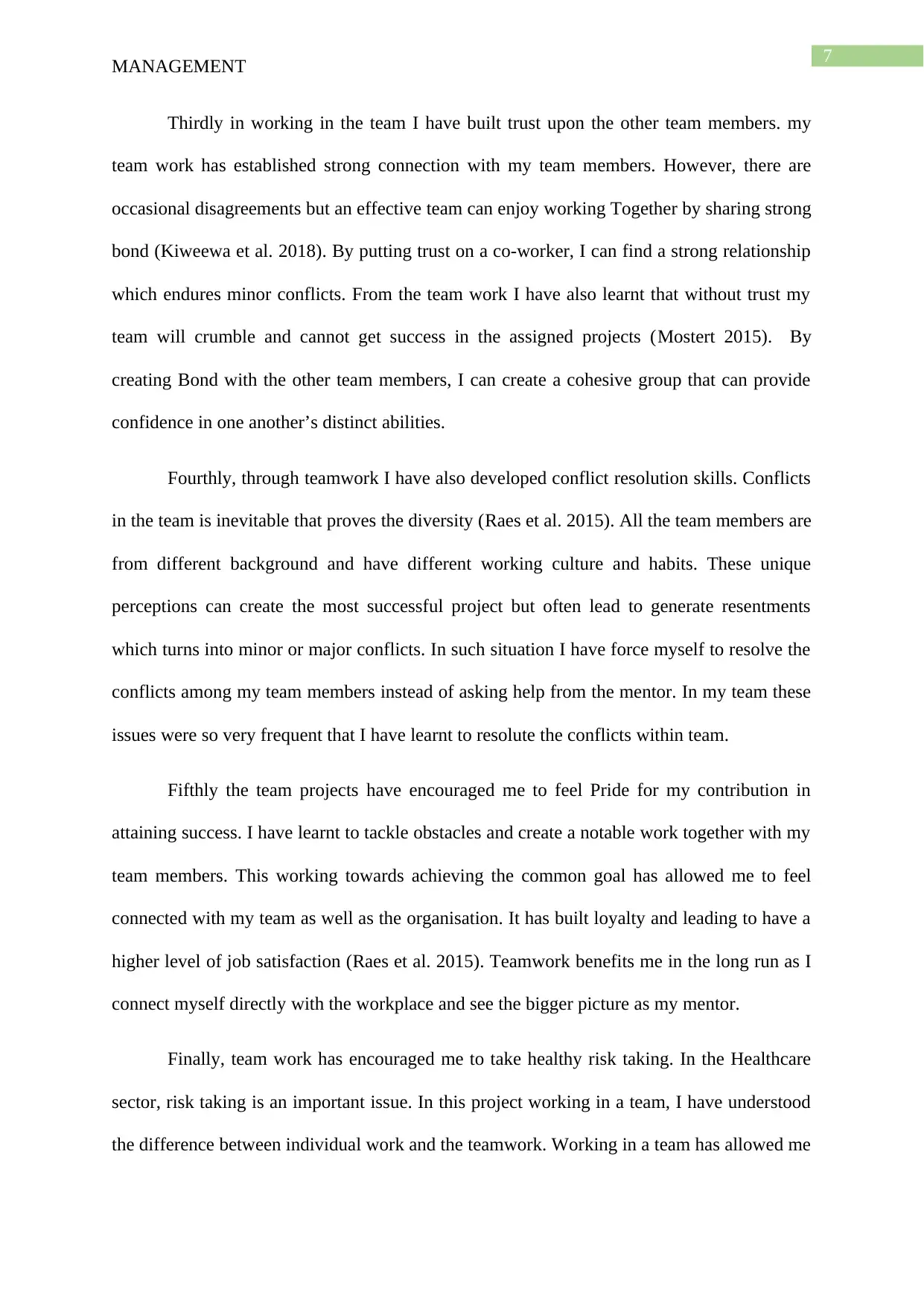
7
MANAGEMENT
Thirdly in working in the team I have built trust upon the other team members. my
team work has established strong connection with my team members. However, there are
occasional disagreements but an effective team can enjoy working Together by sharing strong
bond (Kiweewa et al. 2018). By putting trust on a co-worker, I can find a strong relationship
which endures minor conflicts. From the team work I have also learnt that without trust my
team will crumble and cannot get success in the assigned projects (Mostert 2015). By
creating Bond with the other team members, I can create a cohesive group that can provide
confidence in one another’s distinct abilities.
Fourthly, through teamwork I have also developed conflict resolution skills. Conflicts
in the team is inevitable that proves the diversity (Raes et al. 2015). All the team members are
from different background and have different working culture and habits. These unique
perceptions can create the most successful project but often lead to generate resentments
which turns into minor or major conflicts. In such situation I have force myself to resolve the
conflicts among my team members instead of asking help from the mentor. In my team these
issues were so very frequent that I have learnt to resolute the conflicts within team.
Fifthly the team projects have encouraged me to feel Pride for my contribution in
attaining success. I have learnt to tackle obstacles and create a notable work together with my
team members. This working towards achieving the common goal has allowed me to feel
connected with my team as well as the organisation. It has built loyalty and leading to have a
higher level of job satisfaction (Raes et al. 2015). Teamwork benefits me in the long run as I
connect myself directly with the workplace and see the bigger picture as my mentor.
Finally, team work has encouraged me to take healthy risk taking. In the Healthcare
sector, risk taking is an important issue. In this project working in a team, I have understood
the difference between individual work and the teamwork. Working in a team has allowed me
MANAGEMENT
Thirdly in working in the team I have built trust upon the other team members. my
team work has established strong connection with my team members. However, there are
occasional disagreements but an effective team can enjoy working Together by sharing strong
bond (Kiweewa et al. 2018). By putting trust on a co-worker, I can find a strong relationship
which endures minor conflicts. From the team work I have also learnt that without trust my
team will crumble and cannot get success in the assigned projects (Mostert 2015). By
creating Bond with the other team members, I can create a cohesive group that can provide
confidence in one another’s distinct abilities.
Fourthly, through teamwork I have also developed conflict resolution skills. Conflicts
in the team is inevitable that proves the diversity (Raes et al. 2015). All the team members are
from different background and have different working culture and habits. These unique
perceptions can create the most successful project but often lead to generate resentments
which turns into minor or major conflicts. In such situation I have force myself to resolve the
conflicts among my team members instead of asking help from the mentor. In my team these
issues were so very frequent that I have learnt to resolute the conflicts within team.
Fifthly the team projects have encouraged me to feel Pride for my contribution in
attaining success. I have learnt to tackle obstacles and create a notable work together with my
team members. This working towards achieving the common goal has allowed me to feel
connected with my team as well as the organisation. It has built loyalty and leading to have a
higher level of job satisfaction (Raes et al. 2015). Teamwork benefits me in the long run as I
connect myself directly with the workplace and see the bigger picture as my mentor.
Finally, team work has encouraged me to take healthy risk taking. In the Healthcare
sector, risk taking is an important issue. In this project working in a team, I have understood
the difference between individual work and the teamwork. Working in a team has allowed me
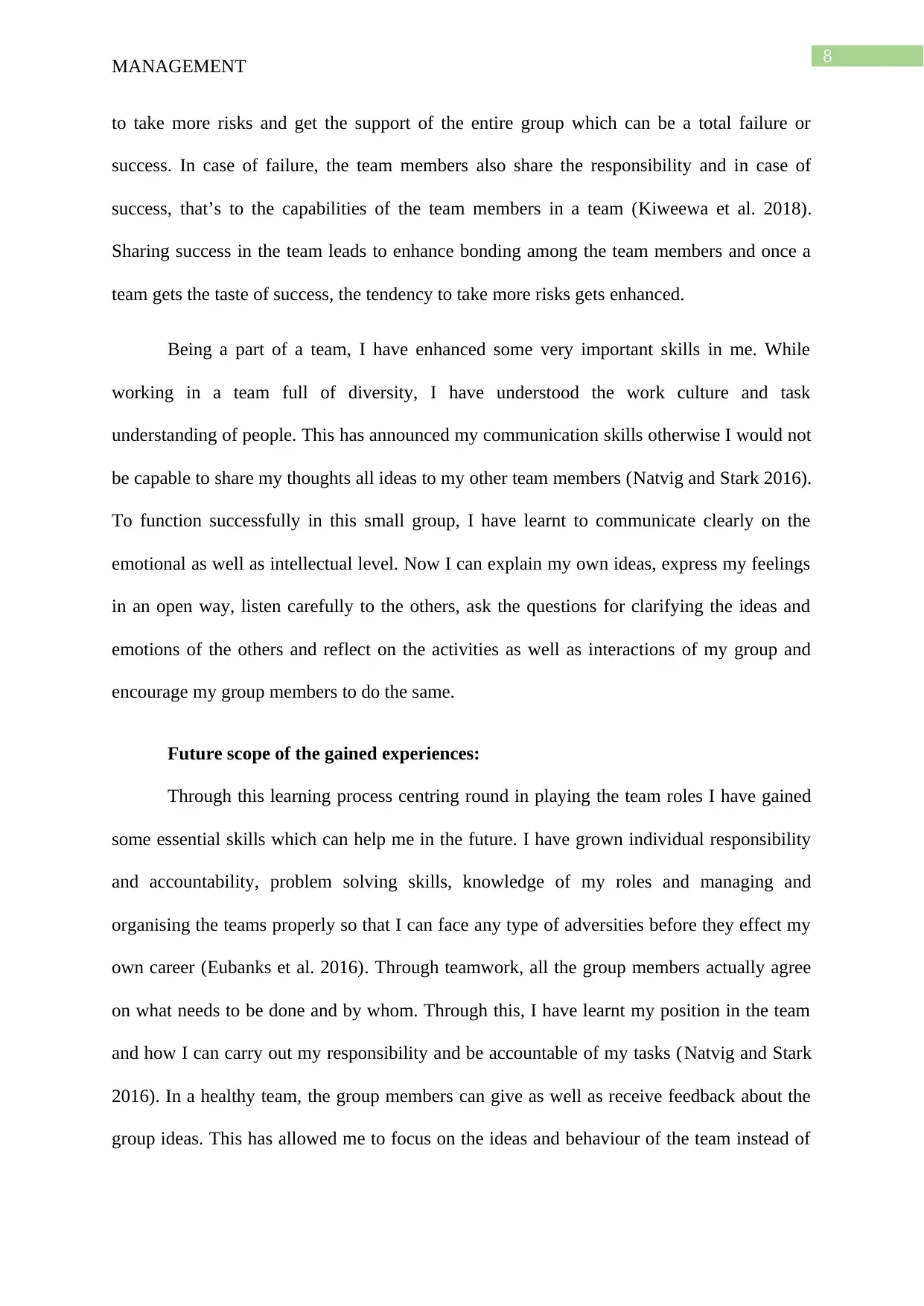
8
MANAGEMENT
to take more risks and get the support of the entire group which can be a total failure or
success. In case of failure, the team members also share the responsibility and in case of
success, that’s to the capabilities of the team members in a team (Kiweewa et al. 2018).
Sharing success in the team leads to enhance bonding among the team members and once a
team gets the taste of success, the tendency to take more risks gets enhanced.
Being a part of a team, I have enhanced some very important skills in me. While
working in a team full of diversity, I have understood the work culture and task
understanding of people. This has announced my communication skills otherwise I would not
be capable to share my thoughts all ideas to my other team members (Natvig and Stark 2016).
To function successfully in this small group, I have learnt to communicate clearly on the
emotional as well as intellectual level. Now I can explain my own ideas, express my feelings
in an open way, listen carefully to the others, ask the questions for clarifying the ideas and
emotions of the others and reflect on the activities as well as interactions of my group and
encourage my group members to do the same.
Future scope of the gained experiences:
Through this learning process centring round in playing the team roles I have gained
some essential skills which can help me in the future. I have grown individual responsibility
and accountability, problem solving skills, knowledge of my roles and managing and
organising the teams properly so that I can face any type of adversities before they effect my
own career (Eubanks et al. 2016). Through teamwork, all the group members actually agree
on what needs to be done and by whom. Through this, I have learnt my position in the team
and how I can carry out my responsibility and be accountable of my tasks (Natvig and Stark
2016). In a healthy team, the group members can give as well as receive feedback about the
group ideas. This has allowed me to focus on the ideas and behaviour of the team instead of
MANAGEMENT
to take more risks and get the support of the entire group which can be a total failure or
success. In case of failure, the team members also share the responsibility and in case of
success, that’s to the capabilities of the team members in a team (Kiweewa et al. 2018).
Sharing success in the team leads to enhance bonding among the team members and once a
team gets the taste of success, the tendency to take more risks gets enhanced.
Being a part of a team, I have enhanced some very important skills in me. While
working in a team full of diversity, I have understood the work culture and task
understanding of people. This has announced my communication skills otherwise I would not
be capable to share my thoughts all ideas to my other team members (Natvig and Stark 2016).
To function successfully in this small group, I have learnt to communicate clearly on the
emotional as well as intellectual level. Now I can explain my own ideas, express my feelings
in an open way, listen carefully to the others, ask the questions for clarifying the ideas and
emotions of the others and reflect on the activities as well as interactions of my group and
encourage my group members to do the same.
Future scope of the gained experiences:
Through this learning process centring round in playing the team roles I have gained
some essential skills which can help me in the future. I have grown individual responsibility
and accountability, problem solving skills, knowledge of my roles and managing and
organising the teams properly so that I can face any type of adversities before they effect my
own career (Eubanks et al. 2016). Through teamwork, all the group members actually agree
on what needs to be done and by whom. Through this, I have learnt my position in the team
and how I can carry out my responsibility and be accountable of my tasks (Natvig and Stark
2016). In a healthy team, the group members can give as well as receive feedback about the
group ideas. This has allowed me to focus on the ideas and behaviour of the team instead of
⊘ This is a preview!⊘
Do you want full access?
Subscribe today to unlock all pages.

Trusted by 1+ million students worldwide
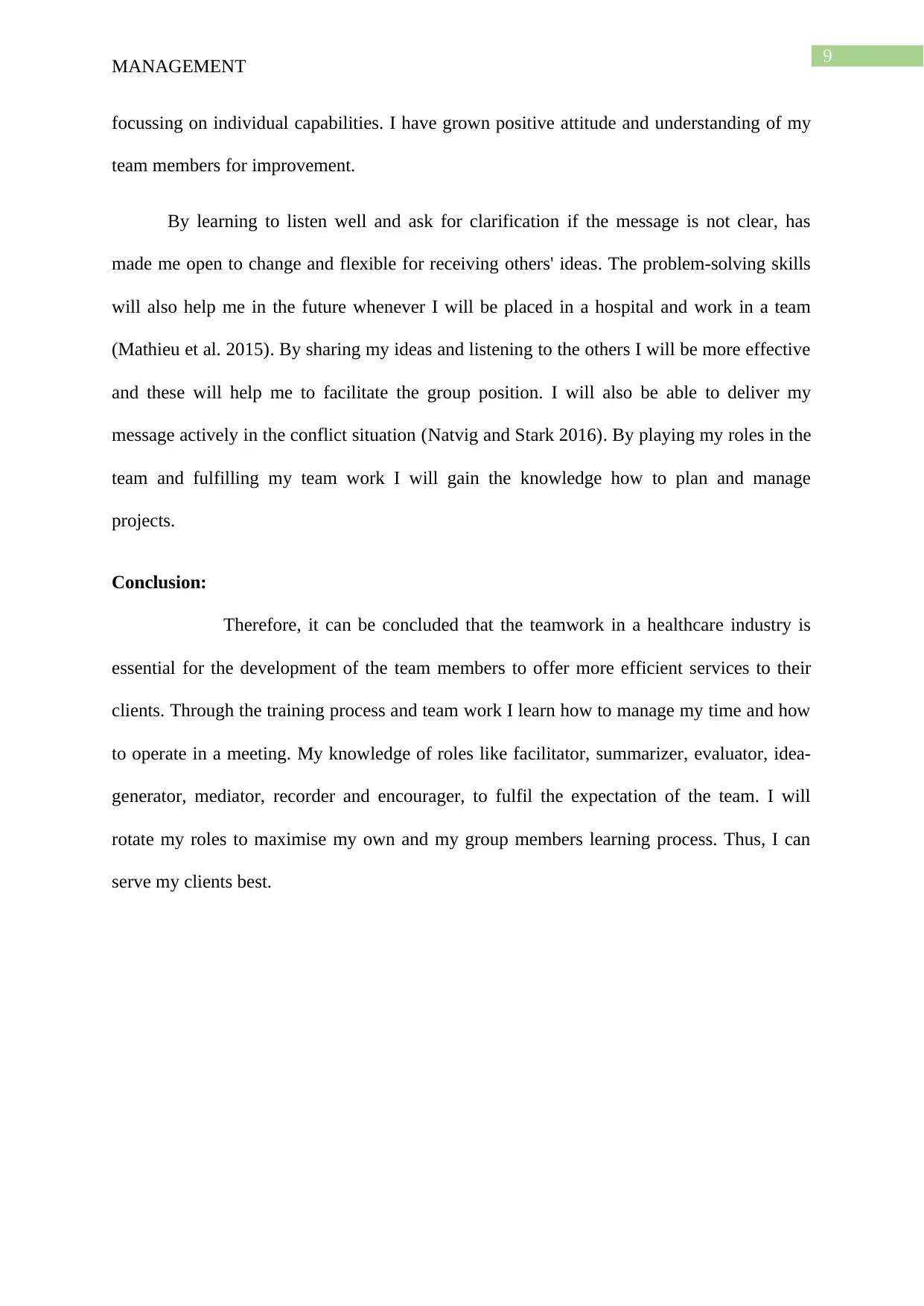
9
MANAGEMENT
focussing on individual capabilities. I have grown positive attitude and understanding of my
team members for improvement.
By learning to listen well and ask for clarification if the message is not clear, has
made me open to change and flexible for receiving others' ideas. The problem-solving skills
will also help me in the future whenever I will be placed in a hospital and work in a team
(Mathieu et al. 2015). By sharing my ideas and listening to the others I will be more effective
and these will help me to facilitate the group position. I will also be able to deliver my
message actively in the conflict situation (Natvig and Stark 2016). By playing my roles in the
team and fulfilling my team work I will gain the knowledge how to plan and manage
projects.
Conclusion:
Therefore, it can be concluded that the teamwork in a healthcare industry is
essential for the development of the team members to offer more efficient services to their
clients. Through the training process and team work I learn how to manage my time and how
to operate in a meeting. My knowledge of roles like facilitator, summarizer, evaluator, idea-
generator, mediator, recorder and encourager, to fulfil the expectation of the team. I will
rotate my roles to maximise my own and my group members learning process. Thus, I can
serve my clients best.
MANAGEMENT
focussing on individual capabilities. I have grown positive attitude and understanding of my
team members for improvement.
By learning to listen well and ask for clarification if the message is not clear, has
made me open to change and flexible for receiving others' ideas. The problem-solving skills
will also help me in the future whenever I will be placed in a hospital and work in a team
(Mathieu et al. 2015). By sharing my ideas and listening to the others I will be more effective
and these will help me to facilitate the group position. I will also be able to deliver my
message actively in the conflict situation (Natvig and Stark 2016). By playing my roles in the
team and fulfilling my team work I will gain the knowledge how to plan and manage
projects.
Conclusion:
Therefore, it can be concluded that the teamwork in a healthcare industry is
essential for the development of the team members to offer more efficient services to their
clients. Through the training process and team work I learn how to manage my time and how
to operate in a meeting. My knowledge of roles like facilitator, summarizer, evaluator, idea-
generator, mediator, recorder and encourager, to fulfil the expectation of the team. I will
rotate my roles to maximise my own and my group members learning process. Thus, I can
serve my clients best.
Paraphrase This Document
Need a fresh take? Get an instant paraphrase of this document with our AI Paraphraser
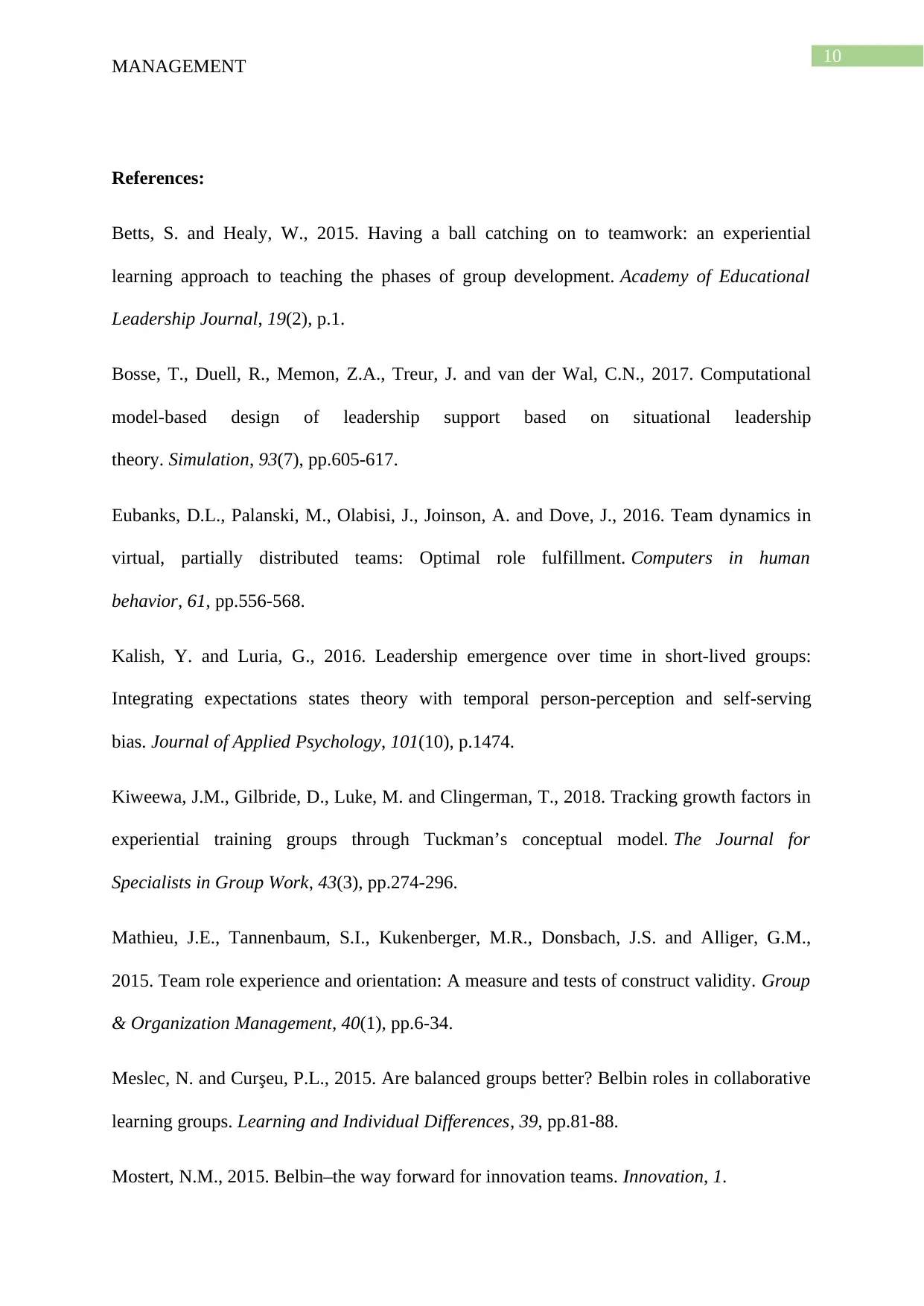
10
MANAGEMENT
References:
Betts, S. and Healy, W., 2015. Having a ball catching on to teamwork: an experiential
learning approach to teaching the phases of group development. Academy of Educational
Leadership Journal, 19(2), p.1.
Bosse, T., Duell, R., Memon, Z.A., Treur, J. and van der Wal, C.N., 2017. Computational
model-based design of leadership support based on situational leadership
theory. Simulation, 93(7), pp.605-617.
Eubanks, D.L., Palanski, M., Olabisi, J., Joinson, A. and Dove, J., 2016. Team dynamics in
virtual, partially distributed teams: Optimal role fulfillment. Computers in human
behavior, 61, pp.556-568.
Kalish, Y. and Luria, G., 2016. Leadership emergence over time in short-lived groups:
Integrating expectations states theory with temporal person-perception and self-serving
bias. Journal of Applied Psychology, 101(10), p.1474.
Kiweewa, J.M., Gilbride, D., Luke, M. and Clingerman, T., 2018. Tracking growth factors in
experiential training groups through Tuckman’s conceptual model. The Journal for
Specialists in Group Work, 43(3), pp.274-296.
Mathieu, J.E., Tannenbaum, S.I., Kukenberger, M.R., Donsbach, J.S. and Alliger, G.M.,
2015. Team role experience and orientation: A measure and tests of construct validity. Group
& Organization Management, 40(1), pp.6-34.
Meslec, N. and Curşeu, P.L., 2015. Are balanced groups better? Belbin roles in collaborative
learning groups. Learning and Individual Differences, 39, pp.81-88.
Mostert, N.M., 2015. Belbin–the way forward for innovation teams. Innovation, 1.
MANAGEMENT
References:
Betts, S. and Healy, W., 2015. Having a ball catching on to teamwork: an experiential
learning approach to teaching the phases of group development. Academy of Educational
Leadership Journal, 19(2), p.1.
Bosse, T., Duell, R., Memon, Z.A., Treur, J. and van der Wal, C.N., 2017. Computational
model-based design of leadership support based on situational leadership
theory. Simulation, 93(7), pp.605-617.
Eubanks, D.L., Palanski, M., Olabisi, J., Joinson, A. and Dove, J., 2016. Team dynamics in
virtual, partially distributed teams: Optimal role fulfillment. Computers in human
behavior, 61, pp.556-568.
Kalish, Y. and Luria, G., 2016. Leadership emergence over time in short-lived groups:
Integrating expectations states theory with temporal person-perception and self-serving
bias. Journal of Applied Psychology, 101(10), p.1474.
Kiweewa, J.M., Gilbride, D., Luke, M. and Clingerman, T., 2018. Tracking growth factors in
experiential training groups through Tuckman’s conceptual model. The Journal for
Specialists in Group Work, 43(3), pp.274-296.
Mathieu, J.E., Tannenbaum, S.I., Kukenberger, M.R., Donsbach, J.S. and Alliger, G.M.,
2015. Team role experience and orientation: A measure and tests of construct validity. Group
& Organization Management, 40(1), pp.6-34.
Meslec, N. and Curşeu, P.L., 2015. Are balanced groups better? Belbin roles in collaborative
learning groups. Learning and Individual Differences, 39, pp.81-88.
Mostert, N.M., 2015. Belbin–the way forward for innovation teams. Innovation, 1.
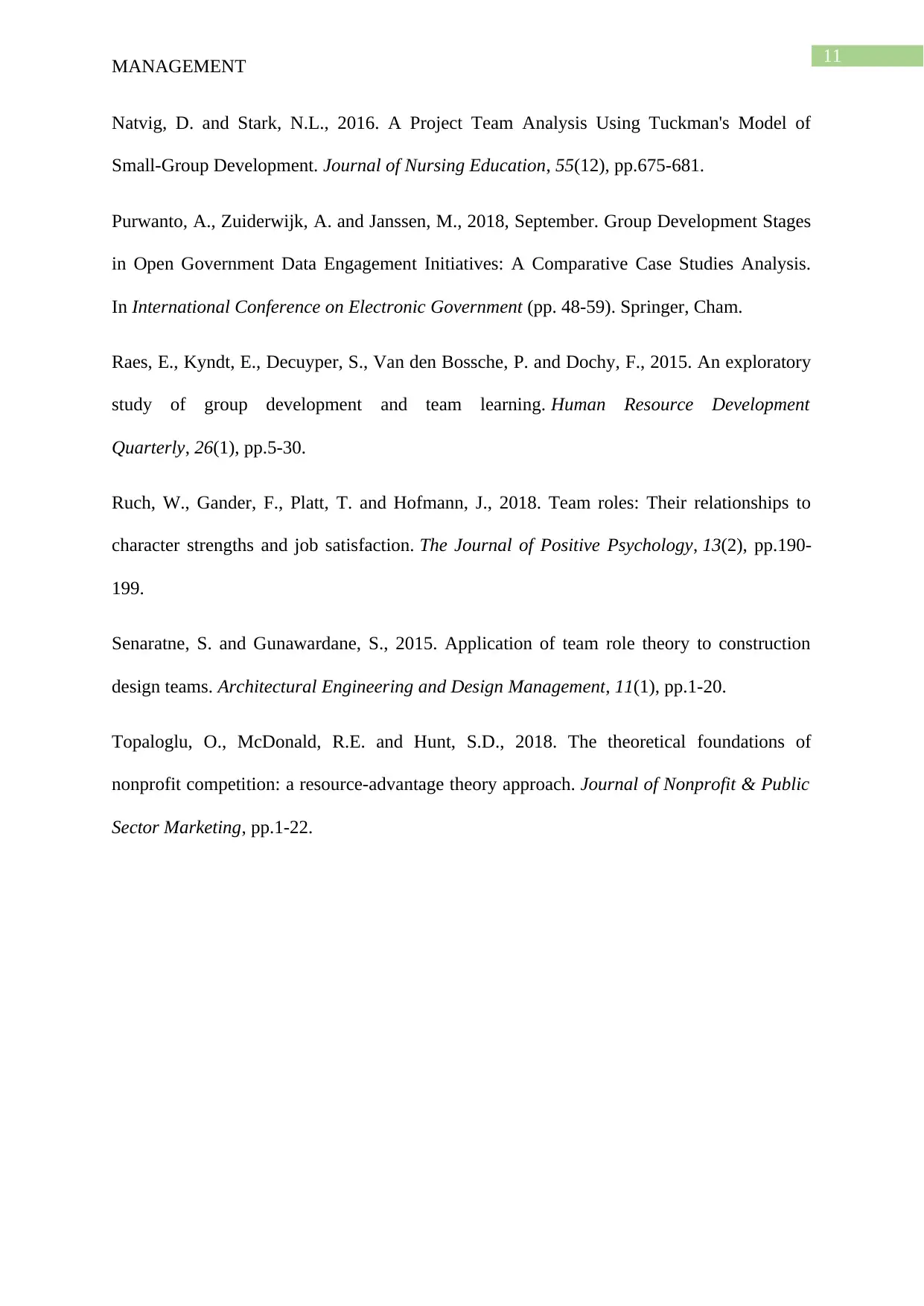
11
MANAGEMENT
Natvig, D. and Stark, N.L., 2016. A Project Team Analysis Using Tuckman's Model of
Small-Group Development. Journal of Nursing Education, 55(12), pp.675-681.
Purwanto, A., Zuiderwijk, A. and Janssen, M., 2018, September. Group Development Stages
in Open Government Data Engagement Initiatives: A Comparative Case Studies Analysis.
In International Conference on Electronic Government (pp. 48-59). Springer, Cham.
Raes, E., Kyndt, E., Decuyper, S., Van den Bossche, P. and Dochy, F., 2015. An exploratory
study of group development and team learning. Human Resource Development
Quarterly, 26(1), pp.5-30.
Ruch, W., Gander, F., Platt, T. and Hofmann, J., 2018. Team roles: Their relationships to
character strengths and job satisfaction. The Journal of Positive Psychology, 13(2), pp.190-
199.
Senaratne, S. and Gunawardane, S., 2015. Application of team role theory to construction
design teams. Architectural Engineering and Design Management, 11(1), pp.1-20.
Topaloglu, O., McDonald, R.E. and Hunt, S.D., 2018. The theoretical foundations of
nonprofit competition: a resource-advantage theory approach. Journal of Nonprofit & Public
Sector Marketing, pp.1-22.
MANAGEMENT
Natvig, D. and Stark, N.L., 2016. A Project Team Analysis Using Tuckman's Model of
Small-Group Development. Journal of Nursing Education, 55(12), pp.675-681.
Purwanto, A., Zuiderwijk, A. and Janssen, M., 2018, September. Group Development Stages
in Open Government Data Engagement Initiatives: A Comparative Case Studies Analysis.
In International Conference on Electronic Government (pp. 48-59). Springer, Cham.
Raes, E., Kyndt, E., Decuyper, S., Van den Bossche, P. and Dochy, F., 2015. An exploratory
study of group development and team learning. Human Resource Development
Quarterly, 26(1), pp.5-30.
Ruch, W., Gander, F., Platt, T. and Hofmann, J., 2018. Team roles: Their relationships to
character strengths and job satisfaction. The Journal of Positive Psychology, 13(2), pp.190-
199.
Senaratne, S. and Gunawardane, S., 2015. Application of team role theory to construction
design teams. Architectural Engineering and Design Management, 11(1), pp.1-20.
Topaloglu, O., McDonald, R.E. and Hunt, S.D., 2018. The theoretical foundations of
nonprofit competition: a resource-advantage theory approach. Journal of Nonprofit & Public
Sector Marketing, pp.1-22.
⊘ This is a preview!⊘
Do you want full access?
Subscribe today to unlock all pages.

Trusted by 1+ million students worldwide
1 out of 12
Related Documents
Your All-in-One AI-Powered Toolkit for Academic Success.
+13062052269
info@desklib.com
Available 24*7 on WhatsApp / Email
![[object Object]](/_next/static/media/star-bottom.7253800d.svg)
Unlock your academic potential
Copyright © 2020–2026 A2Z Services. All Rights Reserved. Developed and managed by ZUCOL.





